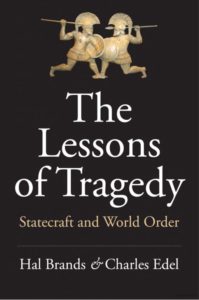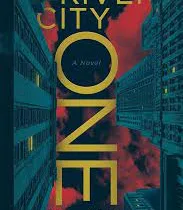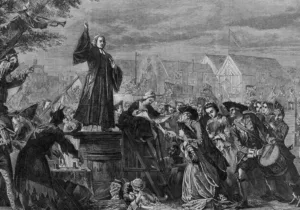What is old has been news of late. From the mini-revival of Stoicism in tech startups and board rooms to the fascination over the Peloponnesian War in some corners of Trump world that fueled the media buzz around Graham Allison’s recent book on “the Thucydides trap,” the ancient Greeks and Romans continue to loom large in the American mind. A new hit in this genre, Hal Brands and Charles Edel’s The Lessons of Tragedy: Statecraft and World Order, provides an insightful view into the ancient Greek sense of tragedy and the lessons Americans can draw from it today.
 Public performances of tragic plays were an important part of civic life in fifth-century Athens, and the authors argue that many of the lessons these plays convey are relevant to American foreign policy. Athenian theatergoers learned to guard against hubris and complacency by developing a “tragic sensibility” that would serve modern Americans in good stead. A person with this sensibility understands that tragedy is a part of life that cannot be avoided, tragedy permeates international affairs, citizens must avoid complacency and fatalism, collective action and communal sacrifice are necessary and good, timely and enduring action are necessary to ward off disaster, and that proportion and restraint must curb hubris.
Public performances of tragic plays were an important part of civic life in fifth-century Athens, and the authors argue that many of the lessons these plays convey are relevant to American foreign policy. Athenian theatergoers learned to guard against hubris and complacency by developing a “tragic sensibility” that would serve modern Americans in good stead. A person with this sensibility understands that tragedy is a part of life that cannot be avoided, tragedy permeates international affairs, citizens must avoid complacency and fatalism, collective action and communal sacrifice are necessary and good, timely and enduring action are necessary to ward off disaster, and that proportion and restraint must curb hubris.
Addressing this philosophy requires an understanding of the theology that undergirds it. The worldview of the Greeks of the fifth century BC rested on a very specific set of assumptions. The world of the gods was chaotic, with each immortal striving for success and pleasure in a largely orderless society: Zeus, the greatest of the gods, could barely rein in his own family, let alone the others. Accordingly, man had to appeal to the gods and their caprices to gain their favor, and there was no ultimate enforcer of the good.
These assumptions had far-reaching, often bloody, consequences. During the Peloponnesian War, the Spartans canceled at least two operations because their preparatory sacrifices were inauspicious. The free-spirited Athenians were no different: a thunderstorm, thought to be a bad omen, shattered their morale during the invasion of Sicily. In the iconic Melian Dialogue, the Melians invoked the justness of their cause as their hope against their Athenian invaders who, steeped in the tragedies Brands and Edel cite, replied, “Of the gods we believe, and of men we know, that by a necessary law of their nature they rule wherever they can… Thus, as far as the gods are concerned, we have no fear and no reason to fear that we shall be at a disadvantage.” The ensuing slaughter showed that the ancient Greeks believed in their gods in deadly earnest.
Of course, Christians do not share this worldview. Trust in a perfect, just God who reigns supreme creates a different set of values than belief in a set of shallow, supernaturally powerful, backbiting immortals.
What, then, to make of the tragic sensibility? Is it, like Stoicism, an idea that collapses without its boutique worldview? Not quite. The tragic sensibility is in a way like Newtonian physics: not exactly accurate, and will get you into trouble if you push its implications to the extremes, but a reasonable approximation of reality. In reality, there is a sovereign and good God, but man is fallen, the human condition will not improve this side of heaven, and human affairs are often marked by tragedy. Even Christians commit atrocities, such as the barbaric siege of Magdeburg that served as an inspiration for the Peace of Westphalia.
The historical section of the book interprets European and global order-building through the lens of tragedy. The aftermath of the Thirty Years’ War and wars of the French Revolution shows that the enormous destructive energy unleashed by these wars required a powerful countervailing force to contain it after the guns fell silent. The Westphalian treaty system and succeeding Council of Europe did not prevent future wars from breaking out in Europe, but they tamed some of the most destructive aspects of inter-European religious and revolutionary warfare, respectively. The diplomats who forged these agreements did so with a clear-eyed understanding of the cost of failure and of man’s tragic nature, ultimately creating imperfect yet durable limitations on war. In each case, they were so successful that they created a false sense of optimism that real peace was at hand. In 1792 and 1914, those delusions were shattered.
Unlike their predecessors, the architects of the post-World War I system refused to accept the ever-present nature of tragedy, preferring to listen to the alluring whispers of disarmament and retrenchment that followed the “war to end all wars.” American and West European failures to confront the rapacity of Germany, Italy, and Japan and their plaintive hopes for appeasement merely gave the totalitarians room to expand and time to consolidate their gains. The resulting war was the most destructive in history. Peace the democracies sought, and peace they could not have.
In the aftermath of the Second World War, US policymakers, who had painfully relearned the lessons of tragedy, with foresight and strenuous labor created a new liberal order to conduct the Cold War. Their realization that the United States could not simply withdraw to Fortress America led them to erect the diplomatic, economic, and security pillars of an order that overcame communism, lifted billions of people worldwide out of poverty, and underpins today’s international order.
As in previous periods, the Cold War order succeeded in limiting the harms of great power competition and was so successful that it planted the seeds for its own destruction. According to Brands and Edel, Americans have forgotten the hard-earned lessons of tragedy and through a combination of elite hubris and popular complacency staggered into some ill-judged overreaches that undermined popular support for the effort needed to maintain the gains produced by the international order.
Did the American people lose their sense of tragedy after the Soviet Union fell, or is something else afoot? It is certainly the case today that popular support for international entanglements is not robust. However, it is unclear if there was as much consensus during the Cold War as the authors describe. The Korean and Vietnam Wars, both of which were consistent with the overarching containment strategy, fatally crippled the Truman and Johnson administrations. The debate over Pershing missile deployment did not similarly doom the Reagan administration, but it hardly boosted the Gipper’s poll numbers. In 1988—with the Soviet threat still looming—nearly half of the American people believed that the United States “should gradually end our treaty commitments and let allies take care of themselves.”
It is also unclear if the current ambivalence about international affairs stems from an unawareness of tragedy. On the contrary, popular entertainment is full of sobering depictions of the cost of conflicts abroad, from the bystanders killed to the physically or psychologically wounded combatants. It may instead be the case that the American public suffers from a false sense of tragedy. Like the driver who sees a crash ahead, slams on the brakes, and congratulates himself on his alertness without noticing the truck behind him that won’t stop in time, the American public might, because of its exposure to the very real costs of America’s foreign policy, think that it is preventing further tragedy. The Obama administration’s self-congratulatory “don’t do stupid [stuff]” slogan is the most naked example of this mistake.
Brands and Edel make a convincing case for the value of creating a stable international system that fosters peace and prosperity and the traits needed to bring it about. Observers of international affairs will benefit from reading it.
Mike Watson is a research associate at Hudson Institute.
Image Credit: Oath of the Horatti, by Jacques-Louis David, 1784, via Wikimedia Commons.







 Live in the DC area? Sign-up for Providence's in-person events list!
Live in the DC area? Sign-up for Providence's in-person events list!